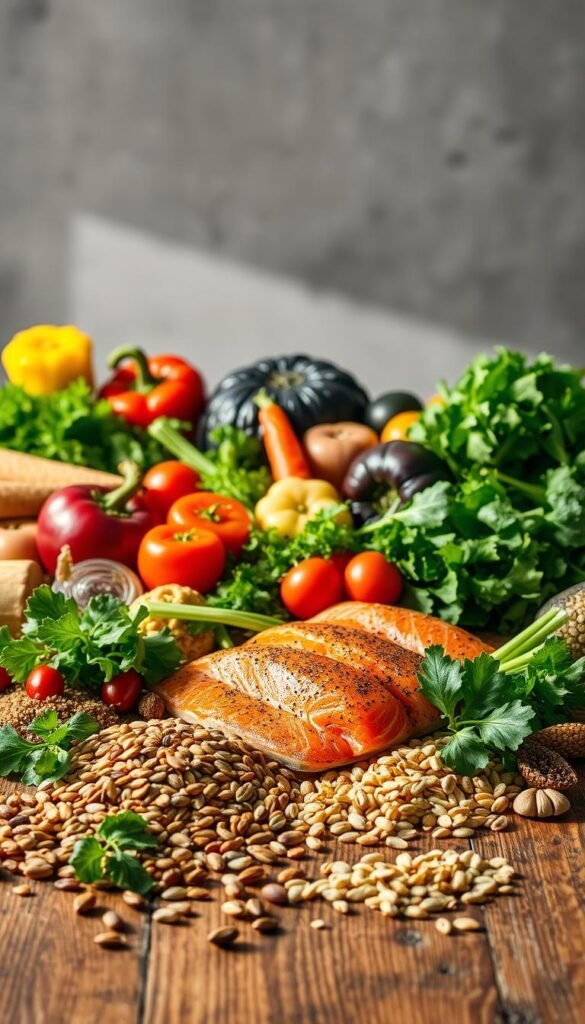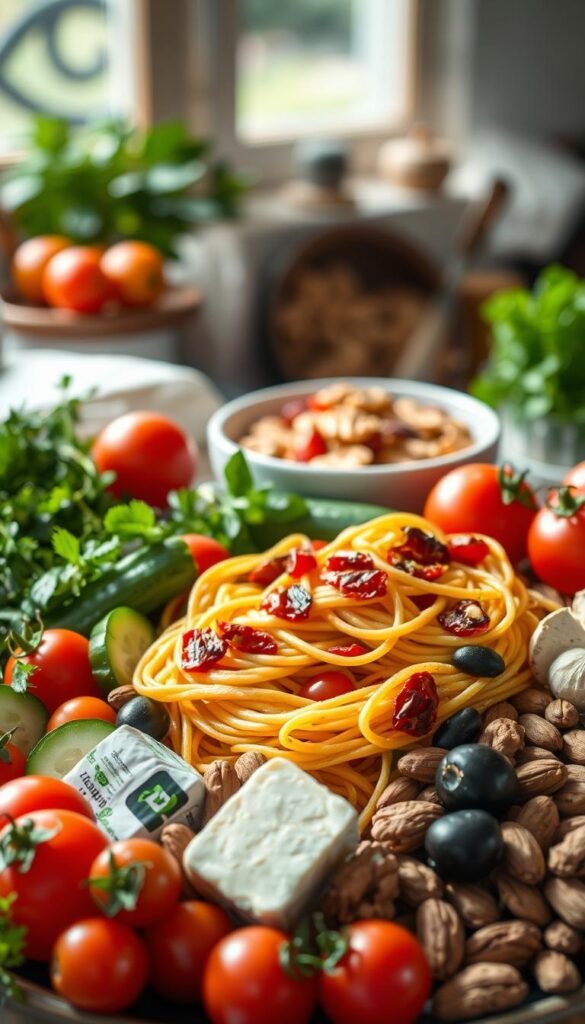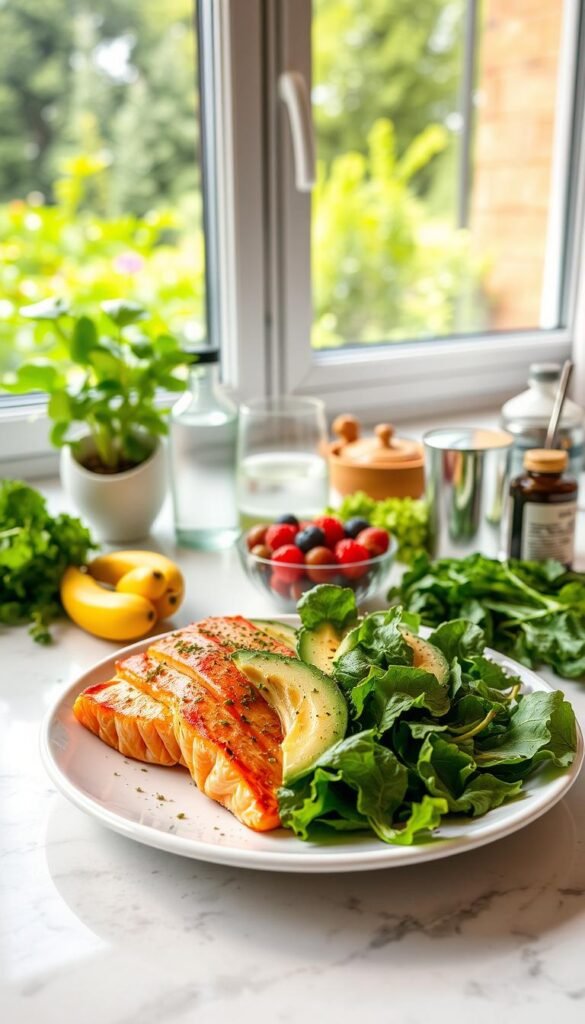What Food is Good for Stroke Recovery
Have you ever wondered how your diet can impact your recovery after a stroke? The foods you eat play a crucial role in your overall health and can significantly influence your body’s healing process.
Making the right dietary changes can help prevent future strokes and support your rehabilitation. A balanced diet rich in fruits, vegetables, lean proteins, and whole grains is essential. By focusing on the right nutrition, you can take a proactive approach to your recovery and improve your long-term health outcomes.
Key Takeaways
- A balanced diet is crucial for stroke recovery and prevention.
- Eating fruits, vegetables, lean proteins, and whole grains supports overall health.
- Dietary changes can help prevent future strokes.
- Nutrition plays a significant role in the body’s healing process.
- A healthy diet can improve long-term health outcomes after a stroke.
- Evidence-based dietary approaches like the Mediterranean diet show promising results.
Understanding the Role of Diet in Stroke Recovery
The food you eat after a stroke can either hinder or help your recovery, making dietary choices vital. A well-managed diet can significantly impact your risk of experiencing a recurrent stroke and your overall health.

How Nutrition Affects Recovery and Rehabilitation
Nutrition plays a critical role in the recovery and rehabilitation process after a stroke. Managing your blood pressure through diet is one of the most effective strategies for preventing future strokes. High blood pressure is the most common stroke risk factor, and diet can help manage it. By making informed dietary choices, you can reduce your risk of future strokes.
Recover Faster with the Best Foods for Surgery Recovery
The Connection Between Diet and Preventing Future Strokes
The dietary changes that can help reduce future strokes can also help manage blood pressure. It’s especially important for individuals with high blood pressure to monitor their sodium intake. The DASH (Dietary Approaches to Stop Hypertension) eating plan is particularly beneficial as it targets stroke risk factors. By adopting a diet rich in fruits, vegetables, and whole grains, you can lower your risk of future strokes.
Understanding the direct relationship between your dietary choices and your risk of experiencing a recurrent stroke is crucial. By incorporating cholesterol-lowering foods, maintaining stable blood sugar levels, and consuming anti-inflammatory foods, you can protect your blood vessels and reduce chronic inflammation that contributes to stroke risk.
What Food is Good for Stroke Recovery: Essential Nutrients
The right foods can significantly impact your stroke recovery journey. A well-balanced diet rich in essential nutrients can support your body’s healing process and improve overall health. As you navigate your recovery, it’s crucial to understand which foods can provide the necessary nutrients for optimal healing.

Foods Rich in Antioxidants and Anti-inflammatory Properties
Consuming foods high in antioxidants and anti-inflammatory properties can help protect your brain from further damage and support the healing process. Include a variety of fruits, vegetables, and nuts in your diet. Berries, leafy greens, and walnuts are excellent sources of these beneficial compounds. These foods help reduce inflammation and oxidative stress, promoting a healthier recovery.
Omega-3 Fatty Acids and Brain Health
Omega-3 fatty acids play a crucial role in brain health and recovery. Foods rich in omega-3s, such as fatty fish (salmon, sardines, and mackerel), flaxseeds, and chia seeds, can support neural recovery and reduce inflammation. Incorporating these foods into your diet can help improve your brain’s function and overall well-being.
Protein-Rich Foods for Muscle Recovery
Protein is essential for muscle recovery and overall bodily function. Include protein-rich foods like lean meats, poultry, fish, eggs, dairy products, legumes, and nuts in your diet. These foods help rebuild and strengthen muscles, supporting your overall recovery and health. Managing your protein intake is vital, especially if you have difficulty swallowing or other dietary restrictions.
Vitamins and Minerals That Support Healing
Certain vitamins and minerals are crucial for your recovery after a stroke. Vitamin B complex supports nerve function and energy production, while vitamin D is essential for brain health and muscle function. Minerals like magnesium, potassium, and zinc contribute to neural recovery and overall cellular function. Antioxidant vitamins (A, C, and E) protect your brain from further damage. Ensuring you get enough of these nutrients through your diet or supplementation is vital for a successful recovery. Some people may also need to manage their carbohydrate intake to control blood sugar levels, making it important to discuss your dietary needs with a registered dietitian.
The Mediterranean Diet for Stroke Recovery
As you navigate the path to recovery after a stroke, incorporating the Mediterranean diet into your meal plan can be highly beneficial. This dietary approach has been widely recognized for its numerous health benefits, particularly in supporting cardiovascular health and aiding in stroke recovery.
Nutritional Foundations
The Mediterranean diet is characterized by its emphasis on whole grains, fruits, vegetables, lean proteins, and healthy fats, such as those found in olive oil. These components work together to provide a balanced intake of essential nutrients that support overall health and specifically aid in the recovery process after a stroke.
Key Components:
- High consumption of fruits and vegetables
- Inclusion of whole grains and legumes
- Use of olive oil as a primary source of fat
- Moderate consumption of fish and poultry
- Low intake of red meat and processed foods
Benefits for Stroke Recovery
Research has shown that the Mediterranean diet can have a positive impact on stroke recovery by reducing inflammation, improving cardiovascular health, and providing essential nutrients for healing. The diet’s focus on nutrient-rich foods helps support the body’s recovery processes.
Some of the research-backed benefits include:
- Reduced risk of future strokes
- Improved cognitive function
- Enhanced overall cardiovascular health

Sample Meal Plan
Implementing the Mediterranean diet into your daily routine can be straightforward with some planning. Here’s a sample meal plan to get you started:
Monday: Breakfast – Greek yogurt with honey and walnuts; Lunch – Grilled chicken salad with olive oil dressing; Dinner – Baked salmon with quinoa and steamed vegetables.
Tips for meal prep: As Zumpano notes, “Meal prep can really help out when times are busy.” You can prep core meals on the weekend or on your day off. Identify quick, easy meals and keep ingredients on hand.
By following this dietary approach and incorporating meal prep strategies, you can make the most of the Mediterranean diet’s benefits for stroke recovery.
Special Dietary Considerations After a Stroke
Following a stroke, making informed dietary choices is critical to support the body’s healing process and minimize the risk of another stroke. A well-structured diet can help manage various health aspects, including blood pressure, swallowing difficulties, and weight loss.
Managing Dysphagia: Foods for Swallowing Difficulties
Many stroke survivors experience dysphagia, or difficulty swallowing. To manage this condition, it’s essential to consume foods that are easy to swallow. These include:
- Pureed fruits and vegetables
- Soft, cooked meats
- Thickened liquids
- Soft-cooked pasta and rice
Using these foods can help reduce the risk of choking and make mealtime safer.
Preventing Weight Loss During Recovery
Stroke patients often experience weight loss due to difficulties in eating or swallowing. To prevent this, focus on consuming nutrient-dense foods that are high in calories and protein. Examples include:
- Nuts and seeds
- Avocados
- Full-fat dairy products
- Protein-rich foods like eggs, fish, and poultry
It’s also crucial to eat smaller, more frequent meals to maintain energy levels.
Dietary Approaches for Managing Blood Pressure
High blood pressure is a significant risk factor for stroke. The DASH (Dietary Approaches to Stop Hypertension) eating plan is specifically designed to help manage blood pressure through dietary changes. Key components include:
- Reducing sodium intake by limiting salt and processed foods
- Increasing consumption of potassium-rich foods like bananas and leafy greens
- Eating foods rich in calcium and magnesium, such as dairy products and nuts
- Focusing on whole grains, fruits, and vegetables
By adopting the DASH diet and being mindful of salt intake, you can help manage your blood pressure and reduce the risk of future strokes.
Practical Tips for Implementing Dietary Changes
Implementing dietary changes after a stroke can be challenging, but with the right strategies, you can make healthy eating a sustainable part of your recovery. Making these changes is not just about adopting a new diet; it’s about creating a lifestyle that supports your overall health and well-being.
Meal Preparation Strategies
You can simplify meal preparation by planning your meals in advance, using a slow cooker, or preparing meals that can be easily reheated. This approach helps in maintaining a consistent diet and reduces the stress associated with last-minute meal decisions.
Working with a Professional
Collaborating with a registered dietitian can provide you with personalized nutrition advice tailored to your specific needs post-stroke. They can help you create a meal plan that is not only healthy but also enjoyable and easy to follow.
Involving Your Support Network
Involving your family and caregivers in your nutritional plan can enhance your adherence to the diet and make mealtime more enjoyable. It’s essential to communicate your needs clearly and involve them in meal planning and preparation to ensure everyone is on the same page.
By implementing these practical tips, you can make dietary changes that support your recovery and overall health. Healthy eating is a journey, and having the right support and strategies can make all the difference.
Conclusion
Your diet can significantly impact your stroke recovery, making it essential to understand what foods are beneficial. A well-planned diet supports health and helps prevent future strokes. As you’ve learned, certain nutrients and food groups play a crucial role in your recovery.
To make the most of your dietary changes, it’s vital to be mindful of your overall health, including managing your weight and preventing weight loss. If you’re having difficulty with blood pressure or other health concerns, consulting with a doctor or dietitian can provide personalized guidance.
Remember, if you’re struggling with chewing, swallowing, or maintaining a healthy weight, don’t hesitate to speak with a doctor or an occupational therapist for support. By making informed dietary choices and seeking professional help when needed, you can significantly improve your recovery outcomes and overall health.

